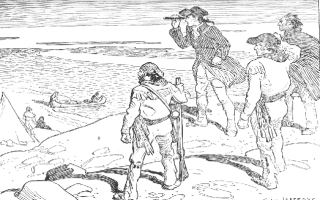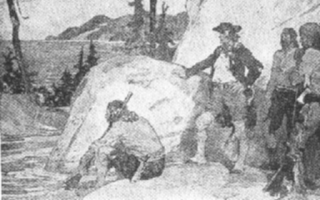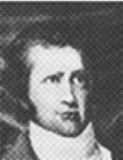
foreword | Historical Narratives | Resources | Links | Contact
NOTES ABOUT NIAGARA 200 YEARS AGO
History tells us how it really was.
Two hundred years ago an American visitor to Niagara discovered to his amazement, that there was a fine settlement north of the American republic. He recorded his observations about this unexpectedly pleasant place as he journeyed from Kingston to Newark by schooner on a lake which he compared to a sea because they were out of sight of land for three days.
 |
The enthralled tourist entered the Niagara River at its mouth, which he described as being large enough to accommodate the "whole British navy." Upper Canada's tiny capital extended for a mile along the lake front and some distance up the river which, he said, literally wriggled with white fish.
 |
Large catches of these delicious fish were dragged ashore in seine nets and salted by settlers in barrels for winter's use. Ten years later Major-General Isaac Brock mentioned that he had helped pull in a seine net containing over one thousand white fish averaging two pounds each. On another occasion a record six thousand of these fine fish were netted in one day.
.In 1794 the land about Newark was inhabited for some fifty miles around. The forests encircling the settlement contained great stands of white pine, oak, black walnut, maple, beach, hickory and basswood. Wielding the only weapons they had, settlers felled the giants with axes and finished the task with fire. Despite the heat, the stinging insects of summer and the extreme cold of winter, settlers made progress and with a great deal of patience they worked wonders. Farmers often cut only sufficient trees to fence their fields, then they girdled the rest and waited for them to die. The absence of underbrush meant the ground around could be worked with an iron-toothed harrow, a plough being used only for second and subsequent crops.
Seven miles up the river was the Lower Landing or Queenston, at whose extensive wharf four vessels from sixty to a hundred tons burthen could discharge their cargoes simultaneously. Sixty wagon-loads a day made the trip along the west bank to the Upper Landing at Chippawa. From there goods went by boat to Fort Erie, thence up the lake to Detroit and points north. The portage proved to be a great source of revenue for farmers, who transported two to three thousand pounds of produce at a shilling and 8 pence a hundredweight. On the return trip their wagons were full of furs from the interior.
The American visitor was astonished to learn that when land was required for settlement, it was purchased, not plundered, from the Native peoples in a fair and equitable manner.
 |
He also discovered that the colonists had full powers to regulate local matters and that they enjoyed the same rights and freedoms the Americans had prior to the revolution. Thanks to a lesson learned from that war, the Imperial British parliament renounced its right to tax colonists, wisely leaving this function to the colonists' own legislature. No one's land was taxed and the British government paid for surveys and support of the civil service.
Vacant land of the best kind was still plentiful and the Governor gave every encouragement to new settlers. The soil was well adapted for raising wheat, Indian corn and flax. Hops grew in abundance, as did wild fruits like plums, mulberries, blackberries, strawberries, raspberries and grapes. Orchards were well developed and produced peaches, cherries, and currants. A great quantity of pork was raised with many of the pigs simply running wild in the woods, where they became well-fatted on nuts falling from the trees. Streams were abundant and some contained mills producing a good quantity of lumber. Because stones were scarce bricks were often used in mason work.
In addition to all this the famed Falls echoed about the area and misted much of the surrounding landscape. The great cataract's appearance exceeded every description the visitor had ever heard of it, its grandeur and sublimity more than person or pen could ever convey. And as if that were not enough, a short distance further up the river an extraordinary fire flared perpetually from the earth, its inflammable air capable of boiling a tea-kettle full of water in 15 minutes. The flame was glorious, but no substance appeared to feed it. It was discovered when brush by the river was set afire and to the awe and amazement of the inhabitants, it continued to blaze long after the bushes were burned.
The visitor learned that Newark was the temporary seat of government, where the Governor, who was held in high esteem, resided. The Assembly was elected by the people every four years, and it had already had made many worthwhile and necessary laws. Weekly courts were held by justices of the peace and judges convened district courts every three months. A chief justice and two associate judges made annual circuits. The tourist took note that gentlemen of respectability lived there and together with the officers of government formed a very intelligent and agreeable society.
The visitor concluded his account with a startling piece of information which was news to him and to everyone else. The first man to have reached the Pacific Ocean by travelling across the continent had recently arrived in the area. After many unsuccessful attempts to cross the continent to the Pacific, the honour of finally making this arduous journey had fallen to the great explorer, Alexander Mackenzie, who on reaching the salt water of the Pacific painted this inscription on the face of a rock. "Alexander Mackenzie from Canada by land, the twenty-second of July, one thousand seven hundred and ninety-three." |
|
Mackenzie at the Pacific |
 |
|
Mackenzie at the Pacific |
 |
|
Sir Alexander Mackenzie, 1755?-1820 |
The great explorer had just arrived in the area for on his way to Montreal in September, 1794. He called on John Graves Simcoe with whom he discussed his plan for expanding fur trade with the west. Mackenzie spoke of the wondrous sights he had seen including Aborigines on the coast who had no firearms, but wore Spanish clothing and used farming implements.
The delighted American tourist concluded that this country had everything needed to make an industrious man happy. He predicted given its temperate climate, rich soil and other natural advantages, that the population of the province would grow quickly and one day make a great country.
Copyright © 2013 Website Administrator